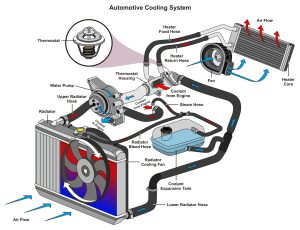- LINCOLN IS PLACING PRIORITY ON SPECIAL ORDERS, CUSTOM ORDER YOUR LINCOLN TODAY
- Start Your Order!

Your engine needs to operate at its optimum temperature to work efficiently. The engine generates large amounts of heat as it works, and many engine components can become damaged due to excessive temperatures. Your radiator is responsible for removing the engine heat, and if it develops a problem, your Lincoln dealer can repair it. These are a few signs that you need a radiator repair.
Signs You Need a Radiator Repair at Your Lincoln Dealer
Leaking Coolant
Coolant is a vital liquid for your Lincoln’s engine, as it removes the heat generated by the hundreds of moving parts in your engine. It does this by moving through your engine at high speed and absorbing the heat radiating out from the hot engine components. Once the heat is absorbed, the coolant is pumped into the radiator where the heat is removed by heat exchange.
The cooling system operates under high pressure and at high speed, which means that even a small leak in the system can lead to a rapid coolant loss. As your engine loses coolant, the speed of the remaining coolant will drop, and your engine temperature will rapidly increase. We’ll examine your cooling system to discover the source of the leak. Once it’s found, we’ll permanently seal the leak,
Damaged Thermostat
Coolant is only released into your engine when its internal temperature reaches a pre-set point. If coolant is released too early, your engine won’t achieve its optimum operating temperature, and you’ll use more fuel. When coolant is released, it will continue to flow until the engine temperature again drops below its pre-set point.
The release of coolant is controlled by a small valve called the thermostat, which automatically opens in response to the increased temperature. This valve can become jammed due to age, and if this happens, the coolant won’t be released, regardless of the engine temperature. With the constant flow of coolant, your engine will start to overheat. We’ll test the thermostat, and replace it if it’s failed.
Air in the Cooling System
The cooling system is air-tight, as air in the system can potentially cause a cooling system failure. If air enters the cooling system, it will form an air bubble that will block the flow of the liquid coolant through the engine. If coolant can’t move rapidly through the system, the heat generated by the engine won’t be removed, and your engine will start overheating.
Unfortunately, air can enter your radiator through even a tiny hole anywhere in the system. If your engine starts to overheat for no apparent reason, you could have an air bubble. We’ll examine your system, and if we find an air bubble, we’ll bleed the system to remove it.
A radiator problem can cause permanent damage to your engine if it’s not repaired ASAP. Call us today at Oliver Lincoln.




